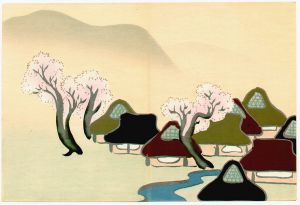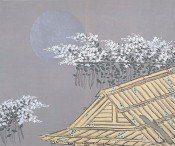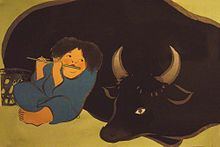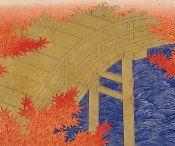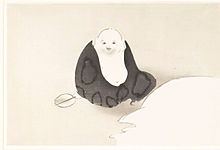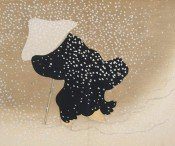Kamisaka Sekka and Art of Japan: Rimpa and Creativity of New Ideas
Lee Jay Walker
Modern Tokyo Times
Kamisaka Sekka (1866-1942) lived in a very fascinating period of history in Japan and likewise his art encompasses much about the inner-struggles of this nation. He was only two years old when the Meiji Restoration of 1868 happened but during his teenage years many changes were occurring in this revolutionary period. However, irrespective of the “forces of light” or “forces of darkness” which engulfed vast parts of the world; from an artistic point of view Sekka lived in a period of new horizons. Therefore, he was free to fuse many aspects of traditional art and mix this with new ideas from outside of Japan.
Sekka was born in Kyoto and the power of this part of Japan must have impressed him greatly. From a young age it was clear that Sekka had been blessed with many talents in the field of art and design. His artistic path in the early period was firmly based on the traditions of Rimpa but he was open to new styles and the modernism theme was a very important aspect of his thinking.
In 1910 the Japanese government sent Sekka to the United Kingdom and while he stayed in Glasgow the Art Nouveau style would influenced him greatly. Sekka was also fascinated by Japonisme and he wanted to understand the attraction of Japanese art in the West and which areas appealed the most. Therefore, his time in Glasgow was most rewarding because his studies enlightened him in many areas.
Also, the trip to Glasgow in 1910 further cemented his deep admiration of aspects of European art. His earlier trip to Europe in 1901 had impacted greatly on Sekka because the Paris International Exposition opened up his eyes to new fresh ideas and concepts.
The combination of studying the masters of Rimpa in the eighteenth and nineteenth centuries and the trends of the West in the early twentieth century; meant that a new creative spark was being ignited within his artistic soul. Sekka also embraced the traditional dimensions of Rimpa and this applies to a broad array of areas. The upshot of this was that Sekka focused on hanging scrolls and painted screens, lacquers, ceramics, books based on woodblock-prints, and textiles.
The Art Institute of Chicago comments that “Sekka was born when Japan was emerging on the world stage and redefining itself in the face of the West. Centuries-old schools of art, such as the decorative Rimpa style with its quintessential Japanese literary and seasonal themes, had become unfashionable. To help keep the country’s unique artistic culture afloat, the government established a policy to upgrade the status of traditional artists that encouraged them to infuse their craft with a dose of modernism. Consequently, in 1910 Sekka was sent abroad to Glasgow, where he was heavily influenced by Art Nouveau. He came home to teach at the newly opened Kyoto Municipal School of Arts and Crafts. Thanks to Sekka, the Rimpa tradition remains a signature of Kyoto design to this day.”
La Chambre Des Reines also pays a rich compliment to Sekka because it is stated that: “Kamisaka Sekka is considered one of the greatest Japanese artists of the first half of the twentieth century. He was the final master of a historic Japanese artistic tradition known as Rimpa, founded in the early seventeenth century, and through his collaborative work in many media and as a proponent of the development of modern crafts, he is known as the father of modern design in Japan.”
The legacy of Sekka is extremely rich and when viewing his artwork it is more than apparent that he had a special gift in many areas. Sekka was indeed “the father of modern design in Japan.”
Modern Tokyo News is part of the Modern Tokyo Times group
http://moderntokyotimes.com Modern Tokyo Times – International News and Japan News
http://sawandjay.com Modern Tokyo Times – Fashion
http://moderntokyonews.com Modern Tokyo News – Tokyo News and International News
http://global-security-news.com Global Security News – Geopolitics and Terrorism
PLEASE JOIN ON TWITTER
https://twitter.com/MTT_News Modern Tokyo Times
PLEASE JOIN ON FACEBOOK
https://www.facebook.com/moderntokyotimes
Some art and cultural articles by Modern Tokyo Times are republished in order to highlight the unique reality of Japanese culture to our growing international readership.
